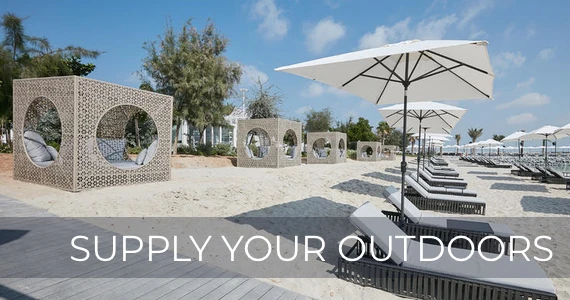A good outdoor shower is a must when designing a property or outdoor spaces. Thanks to their functionalities and aesthetics, outdoor showers, as other luxury outdoor equipments, contribute to a sense of comfort and quality that brings guests to love their experience and definitely recommend a place.
If you, too, wish to add an outdoor shower to your property, here are the questions you should ask to choose the best exterior shower for your project.
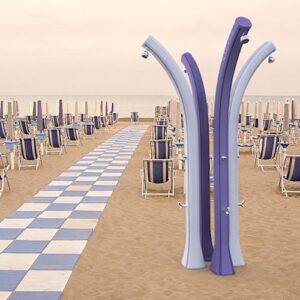
1 – What to consider when choosing your outdoor shower?
By answering the questions below, you will have a clear owerview of your needs:
Usage and location
- When will the exterior shower be used? Will it be in a domestic or commercial setting?
- Given this intended use, what would be the best location for the shower?
- Is it a permanent installation? Will it require special plumbing work?
Frequency of use
- How many people will use the outdoor shower, and how often? At what time of the day? Year-round or only during some seasons?
Accessories and design
- Think about the accessories you would like to have: Will it be helpful to combine classical hand shower and shower head? Will a foot washer be needed? Will the shower only offer cold water or also provide hot water?
- What design, shape, material and/or color would be the nicest to fit your project?
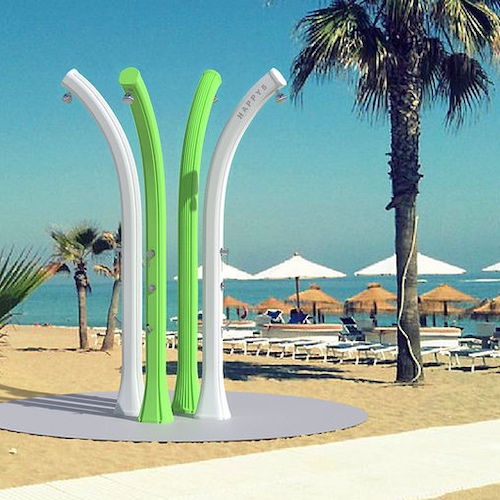
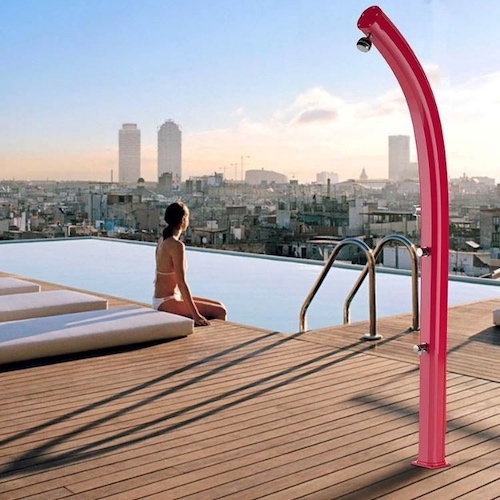
2 – Make sure the technical specifications of the outdoor shower meet your needs.
Based on the requirements you defined, you can choose the most appropriate exterior shower by determining the following specifications:
Type of water heating
- Traditional outdoor showers but also solar showers and hybrid versions are available to heat water.
- Traditional showers require plumbing and a means to heat water; its advantage being that hot water can be provided at any time of the day or year.
- Solar outdoor showers require a simple water inlet as a solar panel built into the shower heats the water up to 60-65°C.
- Hybrid versions combining solar energy and an electrical system can allow the shower to be autonomous in all seasons and at any time of the day, with a simple water and power supplies.
Solar and, to some extent, hybrid solutions have a low environmental impact since the water is heated by direct sunlight: a real asset for environmentally friendly outdoor installations.
Tank Capacity
- For solar heated showers, a tank ranging from 23 liters to 75 liters will keep the water hot.
- A smaller capacity is more suitable for punctual and/or domestic use; some even smaller solar showers are designed for easy transport in a camper or a van.
- Greater capacities are best used in commercial environments such as beaches, public pools, campgrounds, resorts, etc.
Mixer and other equipments
- The two following systems will help protect the environment:
- Temporized mixer, avoiding water waste.
- Built-in safety valve to prevent leaks.
Security
- You might wish to select models including anti-vandal and anti-theft clamping systems.
- Some models come with specific security fastening system for grass and sand.
Designs and materials
- Outdoor showers come in a wide range of materials, including wood, stainless steel, powder-coated steel, aluminum, high-density polyethylene… as well as colors and shapes.
- The design can range from very simple and minimalist to refined and luxurious. The identity and essence of the place where you want to install an outdoor shower will help you find the most suitable reference.
- Whatever material you choose, it should be resistant to corrosion, UV rays, salt and hard water. Shower head and mixers should be of high quality and the warranty at least 2 years-long. If the outdoor shower is made in Italy, this is an additional guarantee of quality and efficiency.
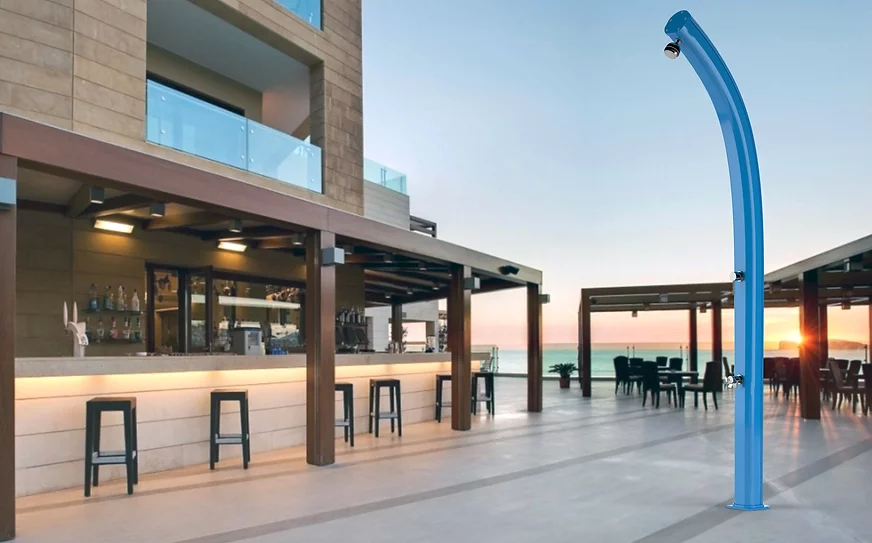
3 – Installation and maintenance
Assembly
Most outdoor showers claim a hassle-free installation, with an easy connection to any garden hose or permanent waterline.
- Traditional showers may request plumbing to be supplied with cold and hot water.
- Solar and hybrid showers only require an outside faucet.
- The exterior showers also come with a fixing system and specific accessories for sand and grass.
Drainage and water waste
Wastewater may simply drain into the ground, or, for a more environmentally friendly approach, collected for reuse or connected to a drainage pipe for treatment.
Maintenance
Most outdoor showers can be dismounted, thus easily maintained and/or winterized. To keep the shower looking like new, you should wash it every two weeks with warm soapy water, rinse and then wipe dry with a soft cloth. For stainless steel or powder-coated steel showers, a standard stainless steel cleaner may be used too. Wooden showers should be washed once a year with soapy water and a soft brush to remove dirt.
Further tips to maintain outdoor furniture during rainy or winter season can be found here.
Thanks to the technological solutions implemented by outdoor shower manufacturers, these showers remain gentle on the environment and their water consumption reasonable. Now it’s time to enjoy your outdoor shower, which with its aesthetic design, durable materials and ease of installation will quickly become a must for you too.
For more information about outdoor showers around the world, read the following articles:
- https://www.housebeautiful.com/home-remodeling/interior-designers/a27021977/building-an-outdoor-shower/
- https://www.familyhandyman.com/article/outdoor-shower-guide/
- https://www.hunker.com/13730523/how-to-build-an-outdoor-shower-a-diy-guide
- https://www.architecturaldigest.com/gallery/most-tranquil-outdoor-showers-world
- https://www.familyhandyman.com/article/outdoor-shower-guide/


